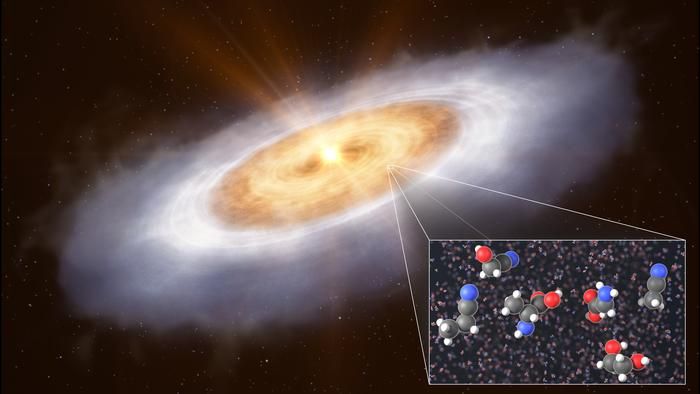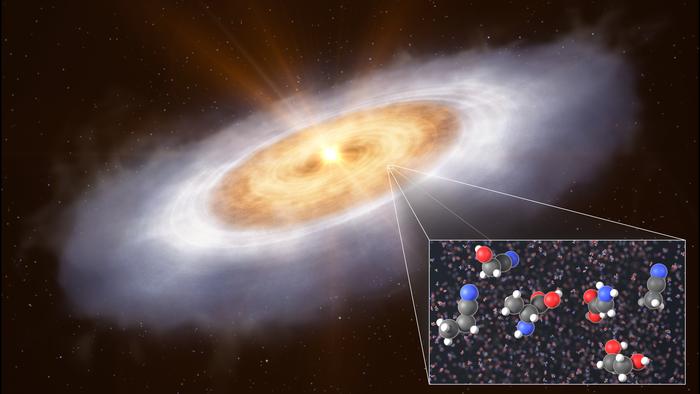
Astronomers have discovered key components to life’s building blocks swirling around a remote baby star, hinting that the stuff of life is far more prevalent throughout the universe than once thought.
The material, discovered circling the protostar V883 Orionis 1,300 light-years from Earth in the constellation Orion, consists of 17 complex organic molecules that include ethylene glycol and glycolonitrile — precursors to components found in DNA and RNA.
The finding, published July 23 in the The Astrophysical Journal Letters, could prompt scientists to rethink just how common the chemical progenitors to life are. Though similar compounds have been discovered elsewhere in space, astronomers previously assumed that much of these would be destroyed by the violent births of stars, leaving life’s seeds scattered around only the rare planetary systems capable of reproducing them.
“Now it appears the opposite is true,” study co-author Kamber Schwarz, an astrochemist at the Max Planck Institute for Astronomy in Heidelberg, Germany, said in a statement. “Our results suggest that protoplanetary discs inherit complex molecules from earlier stages, and the formation of complex molecules can continue during the protoplanetary disc stage.”
Scientists have long traced the chemicals fundamental to life’s origins across space. So far this search has yielded prebiotic molecules in comets, asteroids and floating in the gas and dust of interstellar space.
Stars begin in clouds of gas and dust, which slowly collapse and heat up as they coalesce into protostars and protoplanetary disks from which comets, asteroids and planets eventually form. Yet this process is a violent one, where outflows of shocked gas and intense stellar radiation produce enough energy to disrupt and even reset the steady chemical enrichment that leads to complex organic molecules.
Related: ‘Missing link’ for Earth’s water found around remote baby star
Or that’s what scientists thought. Using the Atacama Large Millimeter/submillimeter Array (ALMA), a collection of 66 radio telescopes in northern Chile, the scientists behind the new study spotted telltale emission lines from a cluster of organic molecules inside V883 Orionis’ protoplanetary disk. The young star is still stoking the fire of nuclear fusion at its core, leading to powerful bursts of radiation.
“These outbursts are strong enough to heat the surrounding disc as far as otherwise icy environments, releasing the chemicals we have detected,” study first author Abubakar Fadul, a graduate student at the Max Planck Institute for Astronomy, said in the statement.
This means that instead of destroying these organic compounds, the star’s growth could instead be freeing them from the icy surfaces upon which they typically form, pointing to “a straight line of chemical enrichment and increasing complexity between interstellar clouds and fully evolved planetary systems,” Fadul said.
While the results are exciting, the scientists cautioned that they remain tentative. The researchers still need to retrieve higher resolution data to confirm their detections and conduct closer studies of how well these compounds hold up as their host star grows.
“Perhaps we also need to look at other regions of the electromagnetic spectrum to find even more evolved molecules,” Fadul said. “Who knows what else we might discover?”
